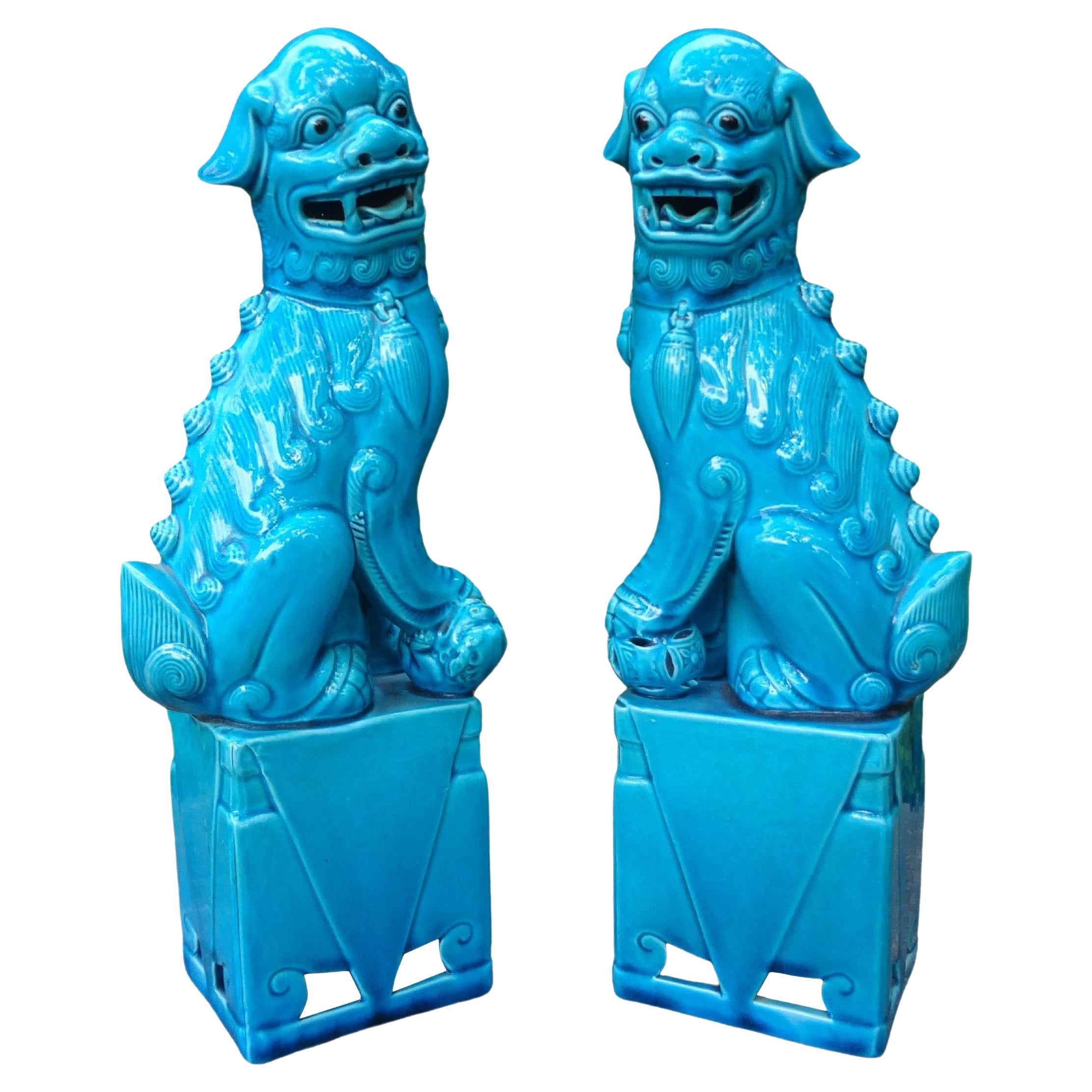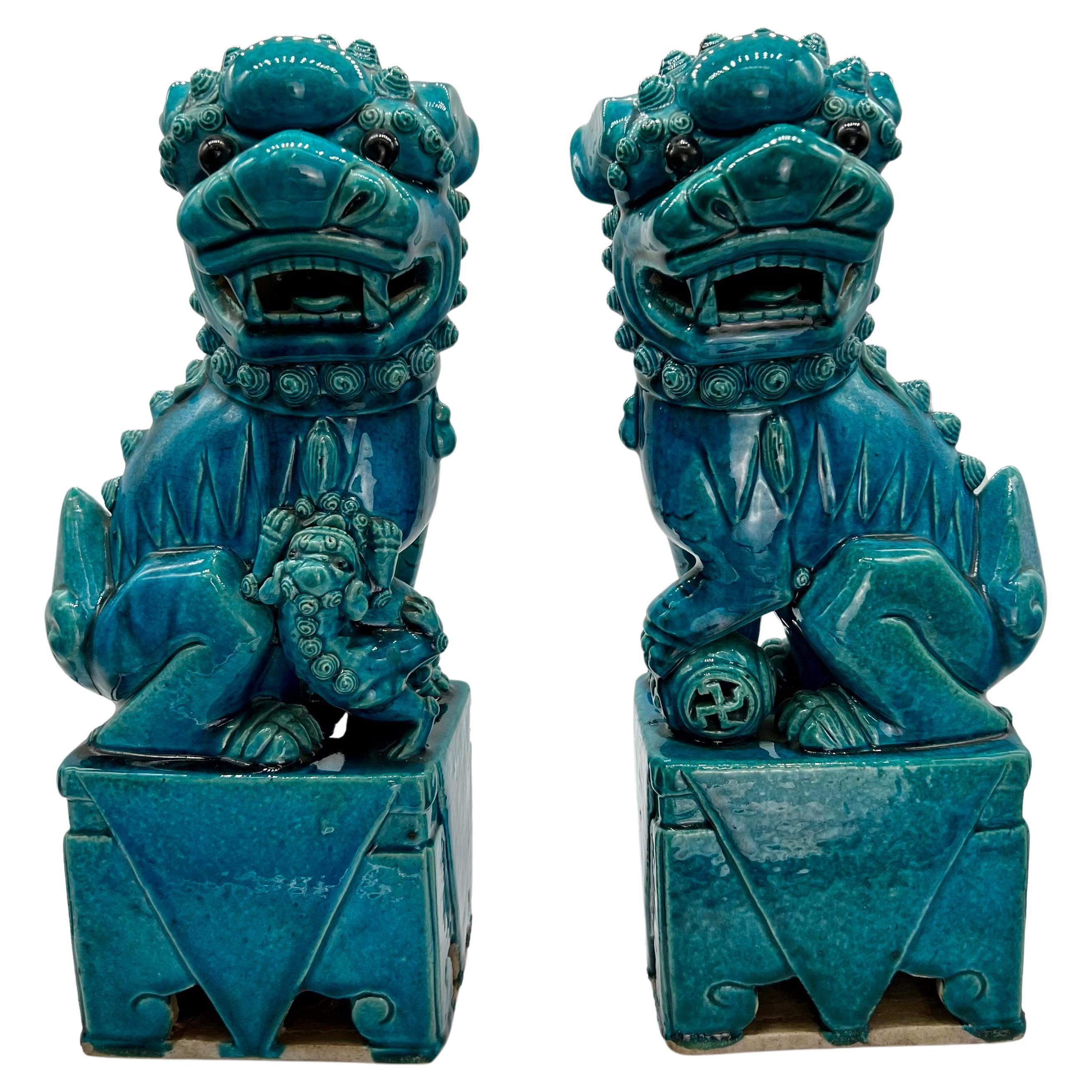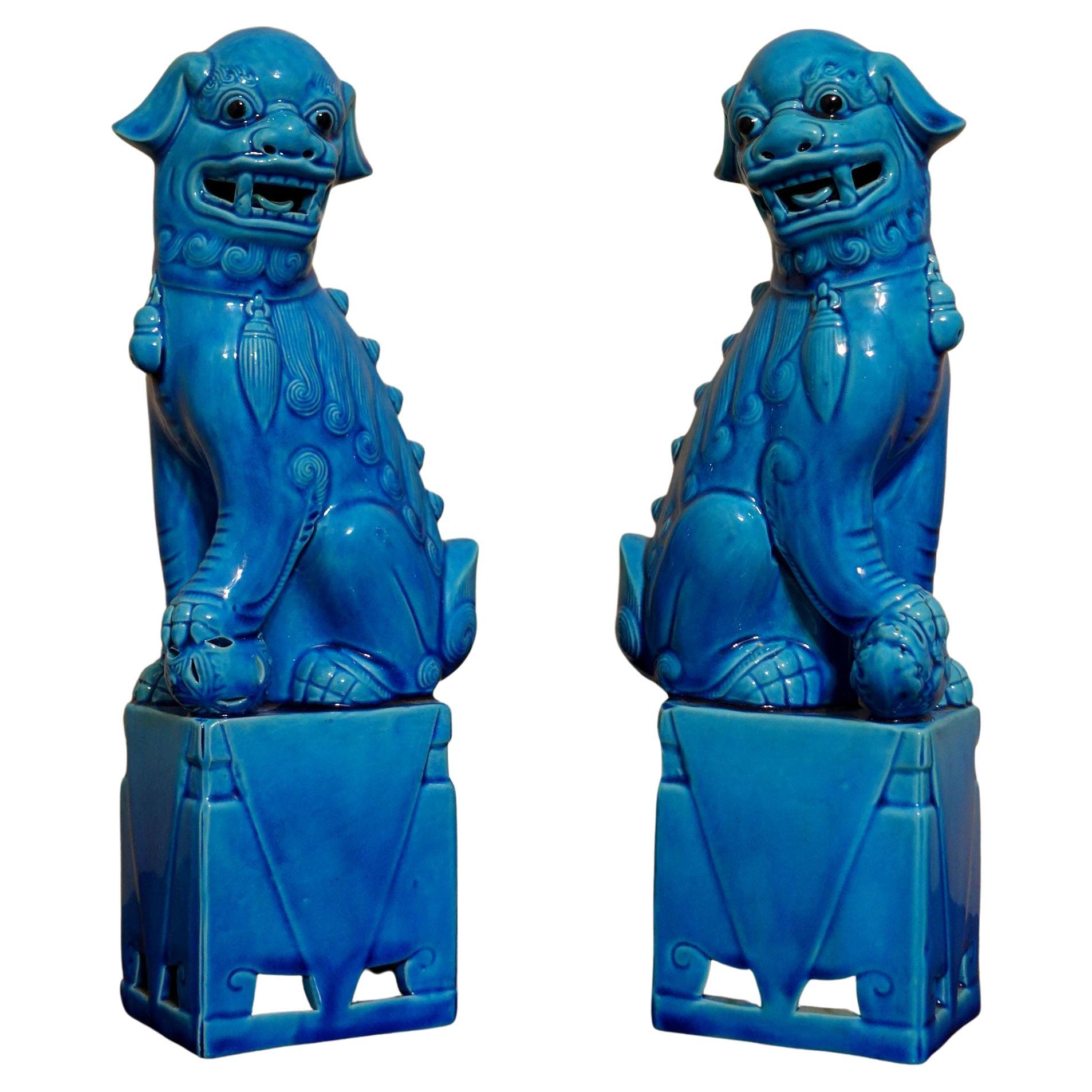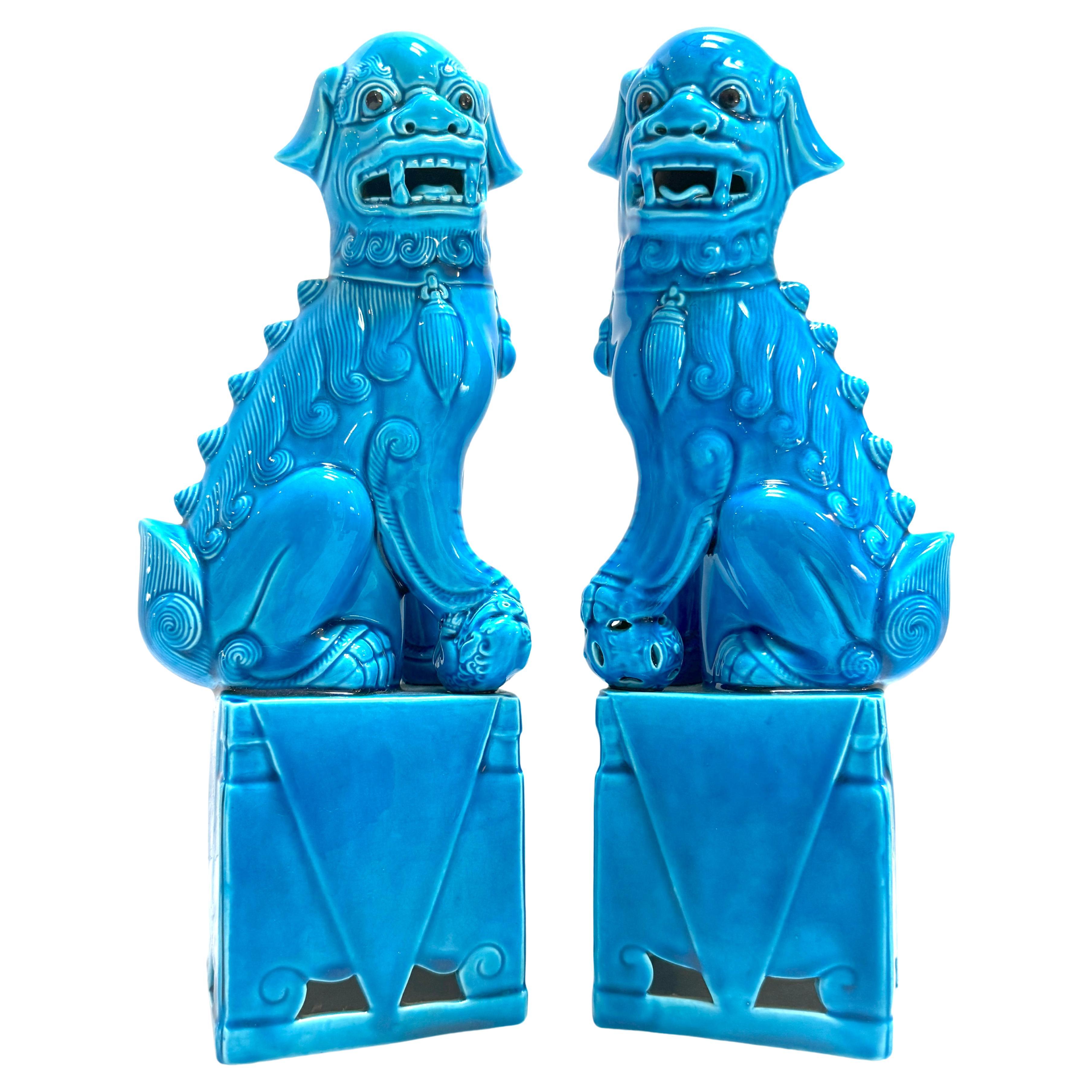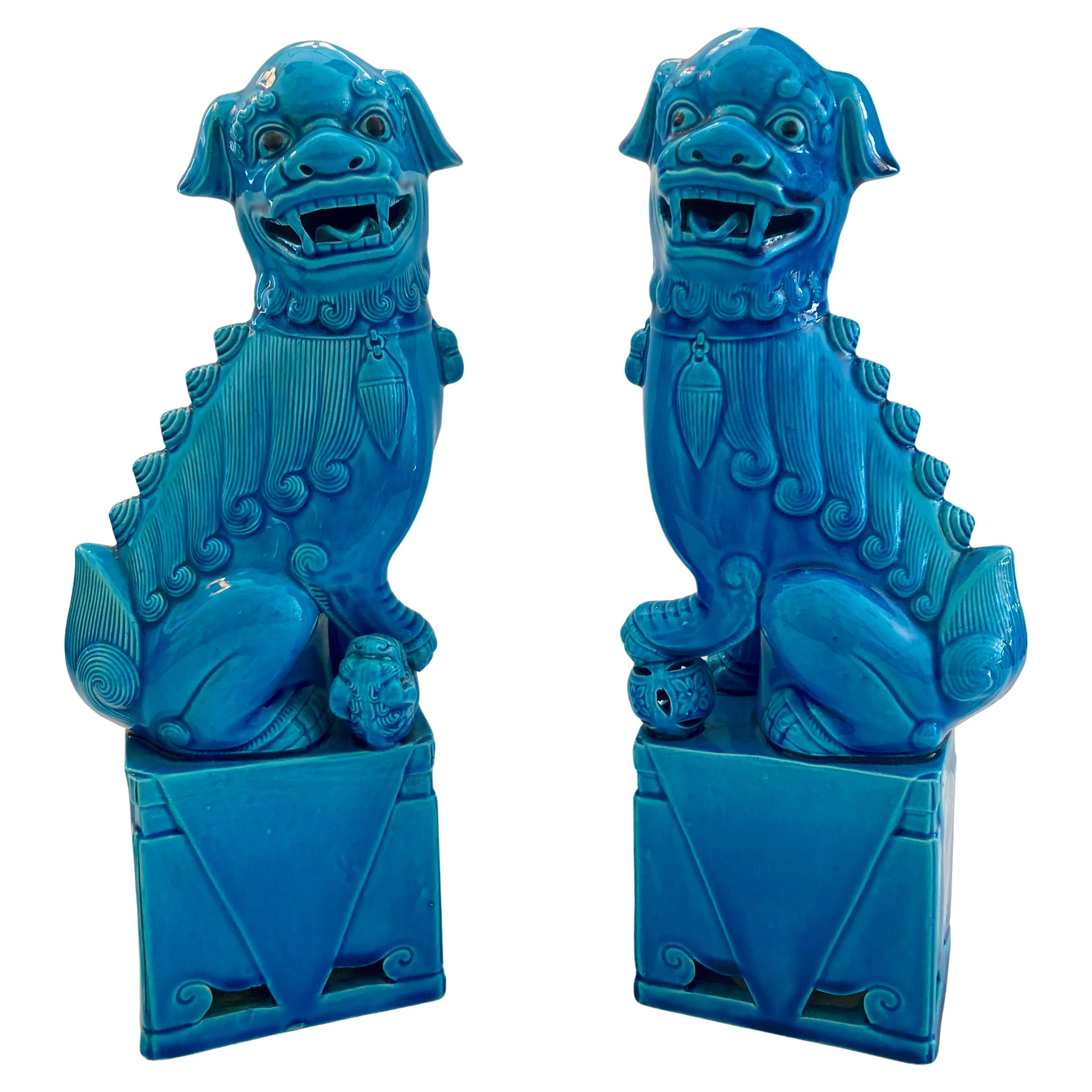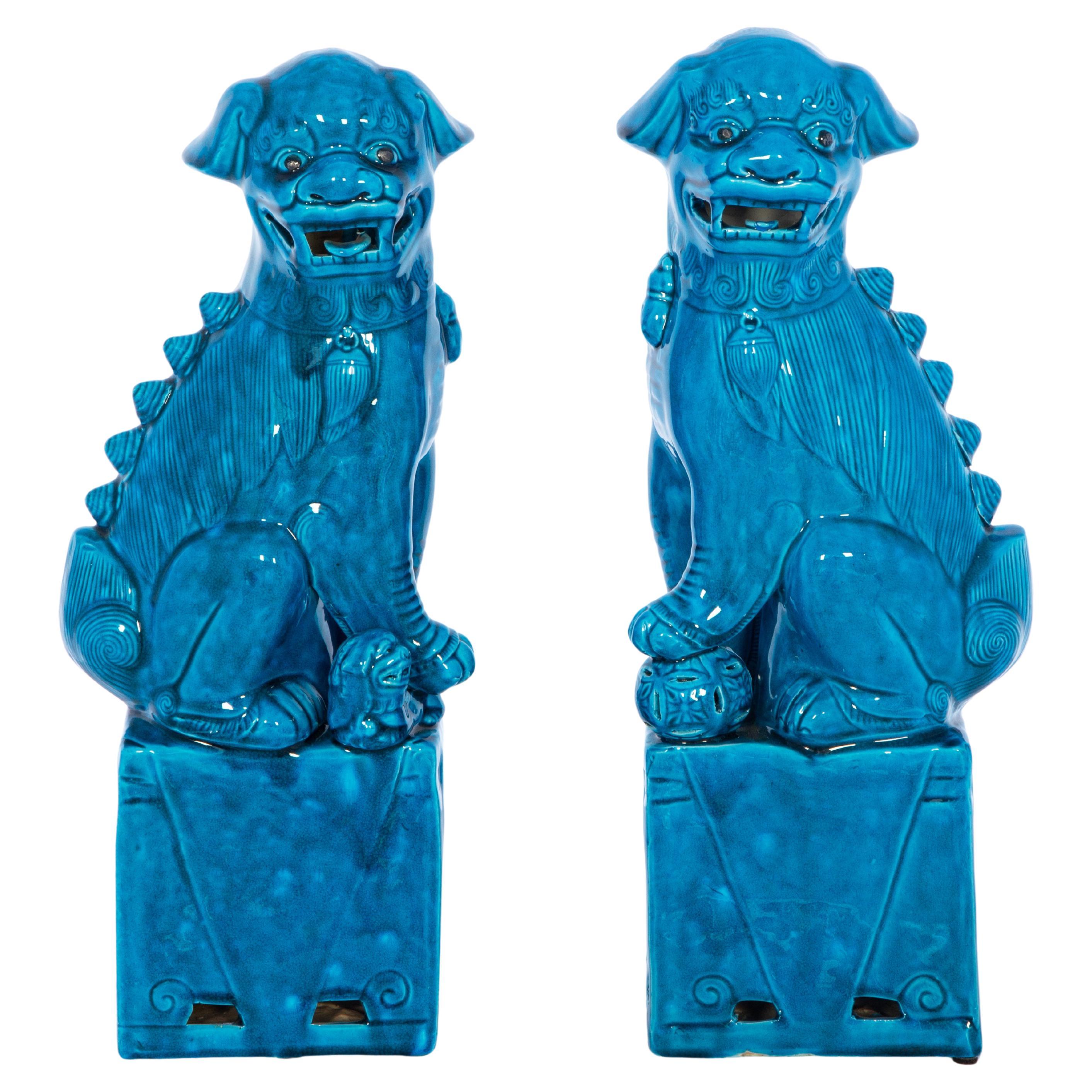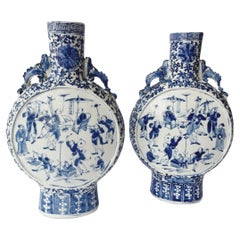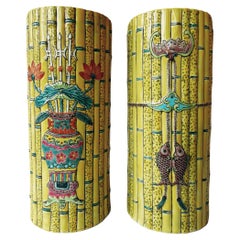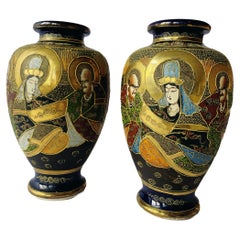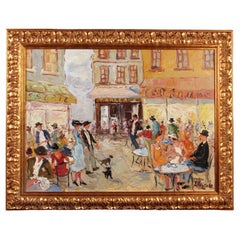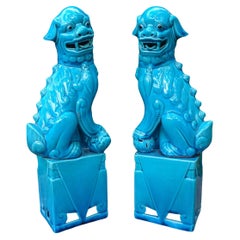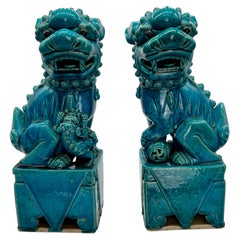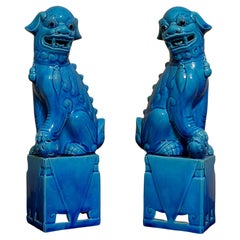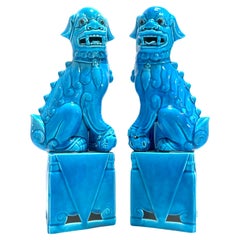Items Similar to Large Pair of Graduated Turquoise Porcelain Foo Dogs. Chinese Circa 1880
Video Loading
Want more images or videos?
Request additional images or videos from the seller
1 of 16
Large Pair of Graduated Turquoise Porcelain Foo Dogs. Chinese Circa 1880
$8,336.27per set
$10,420.34per set20% Off
£6,177.63per set
£7,722.04per set20% Off
€6,960per set
€8,700per set20% Off
CA$11,380.59per set
CA$14,225.74per set20% Off
A$12,660.44per set
A$15,825.55per set20% Off
CHF 6,636.76per set
CHF 8,295.95per set20% Off
MX$154,707.51per set
MX$193,384.38per set20% Off
NOK 84,510.89per set
NOK 105,638.61per set20% Off
SEK 79,555.31per set
SEK 99,444.13per set20% Off
DKK 52,992.83per set
DKK 66,241.04per set20% Off
Shipping
Retrieving quote...The 1stDibs Promise:
Authenticity Guarantee,
Money-Back Guarantee,
24-Hour Cancellation
About the Item
Chinese turquoise-colored porcelain foo dogs from circa 1880 are exquisite examples of traditional Chinese ceramic art. Foo dogs, also known as guardian lions or temple lions, are iconic mythical creatures in Chinese culture that symbolize protection and prosperity. They are often depicted as pairs, with one male and one female, and are commonly placed as sentinels at the entrances of important buildings, such as temples, palaces, and homes.
The color turquoise is highly valued in Chinese culture and is associated with various positive attributes, including protection from evil spirits and bringing good fortune. Turquoise glazes were popular during the Qing Dynasty (1644-1912), particularly in the late 19th century. The glaze used on these porcelain foo dogs often exhibited a beautiful turquoise hue with variations in color intensity due to firing techniques and conditions.
As guardians, foo dogs have specific symbolic characteristics. The male typically holds a ball under its paw, representing the world, while the female holds a cub, symbolizing protection and nurturing. The pair together embodies the balance of yin and yang.
- Dimensions:Height: 19.69 in (50 cm)Width: 7.88 in (20 cm)Depth: 8.86 in (22.5 cm)
- Sold As:Set of 2
- Style:Qing (Of the Period)
- Materials and Techniques:Ceramic,Glazed
- Place of Origin:
- Period:
- Date of Manufacture:1880
- Condition:Wear consistent with age and use.
- Seller Location:Ixelles, BE
- Reference Number:1stDibs: LU8924235490622
About the Seller
No Reviews Yet
Vetted Professional Seller
Every seller passes strict standards for authenticity and reliability
1stDibs seller since 2023
- ShippingRetrieving quote...Shipping from: Ixelles, Belgium
- Return Policy
Authenticity Guarantee
In the unlikely event there’s an issue with an item’s authenticity, contact us within 1 year for a full refund. DetailsMoney-Back Guarantee
If your item is not as described, is damaged in transit, or does not arrive, contact us within 7 days for a full refund. Details24-Hour Cancellation
You have a 24-hour grace period in which to reconsider your purchase, with no questions asked.Vetted Professional Sellers
Our world-class sellers must adhere to strict standards for service and quality, maintaining the integrity of our listings.Price-Match Guarantee
If you find that a seller listed the same item for a lower price elsewhere, we’ll match it.Trusted Global Delivery
Our best-in-class carrier network provides specialized shipping options worldwide, including custom delivery.More From This Seller
View AllPair of Moon-Shaped Vases, China Late 19th Century
Located in Ixelles, BE
A pair of large moon-shaped "flasks" vases painted in blue and white, each flask decorated with scenes of active characters and surrounded by borders of floral motifs and foliate pat...
Category
Antique Late 19th Century Chinese Antiquities
Materials
Porcelain
$64,198 Sale Price / set
20% Off
Pair of 19th Century Qing Dynasty Faux Bamboo Chinese Vases
Located in Ixelles, BE
Faux bamboo Chinese vases were a type of decorative art that emerged during the Qing Dynasty (1644-1912) in China. These porcelain vases were designed to mimic the appearance of bamboo, a plant highly regarded in Chinese culture for its resilience, elegance, and symbolism. Bamboo is associated with attributes such as flexibility, strength, and modesty, making it a popular motif in Chinese art.
In the Qing Dynasty the color yellow held significant symbolism and represented imperial authority, power, and the emperor himself. Yellow was considered the most sacred and prestigious color in Chinese culture, and it had strong associations with the emperor's position as the Son of Heaven and the ruler of all under heaven.
The marks at the bottom of the vases indicate that these were crafted more specifically during the Tongzhi period – an emperor who reigned from 1861 to 1875, which effectively lasted nthrough his adolescence and was largly overshadowed by the rule of his mother, Empress Dowager Cixi. Although he had little influence over state affairs, the events of his reign gave rise to what historians call the “Tongzhi Restoration”, an unsuccessful modernization program.
The polychrome enamels representing on one vase a traditional Chinese kite...
Category
Antique Late 19th Century Chinese Chinese Export Ceramics
Materials
Porcelain
$2,682 Sale Price / set
20% Off
Pair of Japanese Moriage Satsuma Vases with Gold Gilding Circa 1930-1940
Located in Ixelles, BE
Japanese Satsuma vases from the circa 1930-1940 period are a particular style of ceramic art that originated from the Satsuma province of Japan. Satsuma ware is renowned for its intricate hand-painted designs, rich colors, and distinctive crackled glaze.
Satsuma ware dates back to the early 17th century, but it gained widespread popularity in the late 19th and early 20th centuries, including the 1930s and 1940s. Satsuma vases produced during this time often reflected a mix of traditional and modern influences, as Japan went through a period of cultural exchange and artistic experimentation.
Satsuma vases are made from a type of Japanese earthenware clay known for its fine texture and malleability. The vases are hand-formed or wheel-thrown and then meticulously hand-painted with intricate designs using enamel paints. The distinctive crackled glaze was achieved by firing the vases at a relatively low temperature, allowing the glaze to crack during the cooling process.
The moriage technique involves applying three-dimensional, raised ornamentation to the surface of the ceramic piece, creating a visually textured and layered effect. Artisans create three-dimensional patterns, designs, or intricate motifs using a special mixture of clay, slip, or porcelain paste. The raised elements are added by hand to the ceramic body, and each detail is carefully shaped to achieve the desired effect.
The moriage is then gold gilded as some of the intricate ornamental patterns and the halos around the three immortal...
Category
Early 20th Century Japanese Showa Ceramics
Materials
Pottery
Marc Clauzade Painting - Le Couple Au Chien - Ref 495
By Marc Clauzade
Located in Ixelles, BE
Marc Clauzade: Exploring the Soul of Nature
Born with a brush in hand in the picturesque town of Arles, France, Marc Clauzade is a painter whose works resonate with the timeless bea...
Category
Late 20th Century French Paintings
Materials
Wood, Paint
Antoine Giroux Fauvist Painting - Floral Bouquet - Ref 605
Located in Ixelles, BE
Antoine Giroux: Capturing the Vibrancy of the Mediterranean
Born in Brussels in 1955, Antoine Giroux's journey to artistic expression took a unique path through the realms of music ...
Category
Late 20th Century Belgian Paintings
Materials
Canvas, Paint
Antoine Giroux Fauvist Painting - Floral Bouquet - Ref 226
By Antoine Giroux
Located in Ixelles, BE
Antoine Giroux: Capturing the Vibrancy of the Mediterranean
Born in Brussels in 1955, Antoine Giroux's journey to artistic expression took a unique path through the realms of music ...
Category
Mid-20th Century Belgian Paintings
Materials
Wood, Paint
You May Also Like
Pair Of Chinese Turquoise Glazed Porcelain Foo Dogs
Located in Houston, TX
Pair Of Chinese Turquoise Glazed Porcelain Foo Dogs.
A large pair of Chinese turquoise glazed foo dogs dating from the first half of the 20th c...
Category
Vintage 1950s Chinese Chinese Export Ceramics
Materials
Porcelain
Pair of Chinese Turquoise Glazed Foo Dogs, circa 1880
Located in Chicago, IL
A wonderful pair of turquoise glazed Chinese Foo dog statues- circa 1880. Foo dogs were actually lions, yet they resemble a Chow Chow and/or Shih Tzu (dog breeds) which led them to b...
Category
Antique Late 19th Century Chinese Qing Ceramics
Materials
Ceramic
Pair of Large Chinese Turquoise Glazed Porcelain Mounted Foo Dogs
Located in Norton, MA
Fine and very detailed pair of Chinese turquoise glazed foo dogs from the mid-20th century. The hollow biscuit porcelain figures stand raised on a rectangular base and are looking si...
Category
Mid-20th Century Chinese Other Figurative Sculptures
Materials
Porcelain
Large Pair of Chinese Export Turquoise Foo Dogs
Located in West Palm Beach, FL
A Large Pair of Chinese Export Turquoise Foo Dogs
China, 20th century
This impressive pair of Chinese export porcelain foo dogs, made in the 20th century, highlights exquisite cra...
Category
20th Century Chinese Chinese Export Ceramics
Materials
Porcelain
$736 Sale Price / set
20% Off
Turquoise Glazed Porcelain Foo Dogs Large, a Pair
Located in Los Angeles, CA
Pair of turquoise glazed porcelain foo dogs. Large size and beautiful details. Add some classic Asian style and amazing color to your home.
Category
Vintage 1950s Chinese Other Animal Sculptures
Materials
Porcelain
Opposing Pair of Eighteen Inch Vintage Turquoise Ceramic Foo Dogs
Located in West Palm Beach, FL
Pair of large-sized Chinese export (18 inches tall) pottery foo dogs, each having a rich cerulean glaze.
Stock ID: D4039
Category
Mid-20th Century Chinese Chinese Export Ceramics
Materials
Ceramic
More Ways To Browse
Turquoise Ceramics
Turquoise Blue Ceramics
Maling China
Turquoise Porcelain Antique
Antique Chinese Turquoise
Antique China Dogs
Chinese Lions Pair
Lions Of Foo
Temple Lions
Ceramic Dogs
Chinese Turquoise Glaze
Chinese Turquoise Glazed
Chinese Turquoise Porcelain
Asian Furniture Foo Dogs
Chinese Foo Lions
Antique Foo Dogs
Porcelain Chinese Lions
Antique Porcelain Dogs
